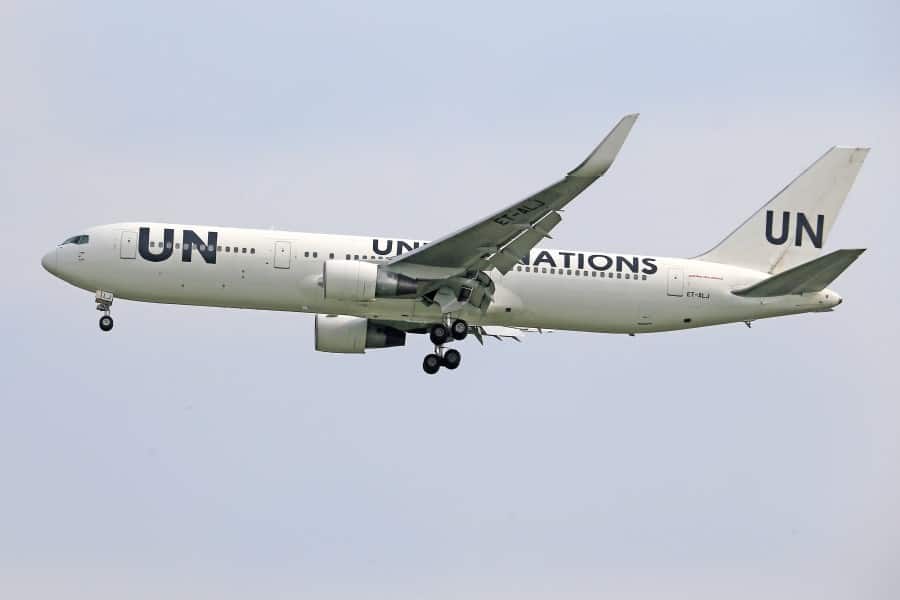This page contains affiliate links. This means if you a follow a link and make a purchase, at no additional cost to you, Humanitarian Careers will receive a commission. Thank you for supporting the site.
When many people think of working for the United Nations, they picture a prestigious international career with postings all around the world. However, UN jobs are notoriously hard to get, and not all UN roles are even overseas. So, how do you know which UN jobs are actually abroad, and how do get the right qualifications and experience to work internationally for the United Nations?
We’ve put together this guide for anyone thinking about an international career with the UN. It’s ideal for students and recent graduates who are hoping to work overseas in a UN role, as well as people looking to transition careers to take an overseas posting with the United Nations.
United Nations Agencies Recruiting International Positions
A first step to getting an international job with the United Nations is understanding which UN agencies are most likely to hire staff from abroad. Every UN body has international staff and it is possible to get an overseas job with the UN in almost any field. However, there are some UN agencies that rely more heavily on international staff, and these are some of the best to target applications at. These include:
- UN High Commissioner For Refugees (UNHCR)
- UN Palestinian Relief And Work Agency (UNRWA)
- UN Children’s Fund (UNICEF)
- World Food Programme (WFP)
- UN Development Programme (UNDP)
- International Organisation For Migration (IOM)
Let’s take a quick look at each of these…
UN High Commissioner For Refugees (UNHCR)
UNHCR is the UN’s refugee agency. It provides support to people forced to flee their homes due to conflict, disaster or persecution. It also gives assistance to communities and governments that host refugees and displaced people.
There are many international roles recruited by UNHCR. Working in 137 countries, the agency recruits’ staff globally to work on refugee assistance programmes, as well as in support roles including finance, HR and logistics.
UN Palestinian Relief And Work Agency (UNRWA)
Founded in 1949, UNRWA assists refugees and their descendants who fled from the creation of the State of Israel. It operates in Jordan, Syria, Lebanon, Gaza and the West Bank.
UNRWA recruits’ positions from across the region, as well as globally, to work on wide-ranging projects providing not only assistance in areas such as education and livelihoods to Palestinian refugees, but also to advocate for Palestinian rights.
UN Children’s Fund (UNICEF)
UNICEF is the United Nations agency working with children and families living in poverty or affected by crises. Working all around the world, UNICEF regularly recruits international roles, especially in positions related to education, childhood nutrition, water and sanitation and livelihoods.
World Food Programme (WFP)
The World Food Programme helps people affected by famine and food insecurity. As one of the UN’s largest humanitarian agencies, WFP recruits a huge number of international positions.
Alongside roles in nutrition, food security and livelihoods, WFP also has a significant focus on logistics and transportation, hosting not only the humanitarian logistics cluster, but also operating UNHAS – the United Nations Humanitarian Air Service.
UN Development Programme (UNDP)
UNDP is the UN’s Development Programme. It aims to sustainably lift people out poverty by assisting nations to run development projects.
Overseas roles recruited by UNDP can include engineers and those with specialisms in infrastructure construction, as well as support roles including finance, logistics and HR. Project managers are also often recruited internationally by UNDP.
International Organization For Migration (IOM)
The International Organisation For Migration, founded in 1951, became part of the United Nations in 2016.
IOM works with people on the move to provide much needed assistance, as well as advocating for refugees, migrants and displaced people. It recruits a wide range of international roles focused on human migration and humanitarian assistance.
Types of UN International Jobs
The United Nations has a huge range of different roles. With hundreds of thousands of employees in 193 countries, there is almost an unlimited number of types of jobs within the UN. With that said, most of the UN agencies recruiting the bulk of the international positions, their jobs fall into two main types.
The first type of overseas positions that the United Nations regularly recruits for are known as programme roles. These jobs are responsible for setting up, running and assessing the actual work the UN delivers.
Generally, programme positions across the UN focus on areas such as education, health, shelter and water and sanitation. The role of programme staff is to ensure that the UN’s assistance is provided to those in need, and give technical guidance on how UN projects are run.
The second type of United Nations job you will commonly see recruited internationally is what are called support roles. These jobs are responsible for supporting the implementation of UN programmes.
Support jobs in the UN pretty much do as they say… they provide support services to UN operations. Examples of some support functions within the UN include finance, human resources, logistics, safety and security, grant management and administration.
Both programme roles and support jobs can be recruited internationally in the UN. However, if you’re looking to work for the United Nations abroad, you need to decide which of these areas interests you more, as this will influence which overseas positions you apply to.

Qualifications You Need To Work Abroad With The UN
In order to work overseas with the UN you need to be qualified. United Nations jobs are highly competitive, and so you need to get the skills and experience the UN needs if you are going to get an international role.
The first step in becoming qualified to work abroad with the UN is to complete a relevant degree. Almost all UN jobs, but especially international postings, require a university level qualification. The majority of UN recruiters will look for candidates who have studied up to masters’ level.
When choosing a degree to study, focus on courses that are highly relevant to the international role within the UN you want to go for. As an example, if you are interested in support functions such as logistics, finance or HR – choose degrees in humanitarian logistics, financial management or international business administration. If you want to work in a technical function, such as on UN medical or nutrition projects, consider degrees in medicine and global health, or childhood nutrition.
Your aim when choosing what to study should be to build practical skills the UN needs on its international missions.
The second step in becoming qualified to work internationally for the United Nations is gaining a strong understanding of the UN and its work.
As well as looking for candidates with strong skills and relevant experience, the United Nations also needs staff who understand how both programme and support roles contribute to the UN’s operations. Taking an online short course is one of the best ways to demonstrate to UN recruiters that you are not only passionate about the UN’s work, but also understand it.
There are a wide range of online courses related to the United Nations, many of which can be taken for free. Adding these to your CV will significantly help your chances of landing an overseas posting with the UN.
United Nations Online Courses
For those wanting to work for the United Nations we highly recommend the online course Global Diplomacy: The United Nations In The World. We think it’s one of the best overviews of the UN and it’s work and would be a great addition to the CV of anyone applying for a UN job. Click the link to enrol on the course.
If you want to know more about how to get a job with the UN then take the United Nations Jobs Guide online course. This course provides great details on the UN recruitment system, what the UN looks for in candidates and what you can do to make your UN application stand out. Follow the link to the course’s page for more information.
Another online course we recommend for those wanting to work in the UN is International Organizations Management. This course shows how large global organizations, including the UN, work. It also highlights many of the challenges, these organizations face. Click the link to be taken to the course’s page.
United Nations International Job Categories
One of the most important things you need to understand if you want to work overseas with the United Nations is the different job categories the UN has.
The United Nations recruitment system is notoriously complex. The organization categorizes different roles depending on where they work and how they are recruited. However, this means there are a few UN job categories that are specifically for international roles. These categories are:
- Professional (P)
- Directors (D)
- Field Service
- Consultants
Now we’ll look at each of these in-turn…
Professional (P)
Probably the most common job category for international postings in the United Nations is Professional, or P, roles. P category jobs in the UN are only recruited internationally. This means that if you are looking to work for the United Nations overseas, you should be applying for P category jobs.
Within the P category of jobs in the UN, the positions are numbered between 2 and 7. This number relates to the amount of experience needed to do the role. The higher the number, the more years of experience is needed. This is why you will see UN jobs listed at P-3 or P-5, for example.
If you are early in your career, consider applying for P-2 or P-3 roles. If you have several years’ experience, especially also working overseas perhaps with an international NGO, consider applying more senior postings.
Directors (D)
As well as P category roles, the United Nations also has D, or Director, category jobs. These are essentially the same as P jobs but are more senior. D category jobs in the UN are also only recruited internationally.
Field Service
The UN often deploys staff internationally to serve on field missions. These jobs directly support the UNs work at field-level, including in areas such as administration, logistics and technical guidance.
Field Service roles in the United Nations are categorized from FS-4 to FS-7. You need a minimum of six years relevant experience to apply for a UN Field Service posting.
Consultants
The United Nations hires a huge number of consultants. They are hired to complete specific pieces of work or provide technical guidance to UN projects. UN consultants often work internationally supporting UN programmes in the field.
Each consultancy within the United Nations has its own terms of reference. These can also be negotiated by the consultant before starting the position. Generally, you need a significant level of experience to be a consultant for the UN, however there are some mid-level and even junior level consultancy openings in the UN.
If you want to learn more about how to get an overseas posting with the United Nations, check out our list of the top UN online courses here.






